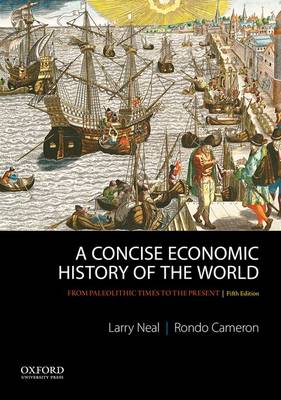
Stock image for illustration purposes only - book cover, edition or condition may vary.
A Concise Economic History of the World: From Paleolithic Times to the Present
Larry Neal
€ 174.98
FREE Delivery in Ireland
Description for A Concise Economic History of the World: From Paleolithic Times to the Present
Paperback. Revised edition of A concise economic history of the world, 2003. Num Pages: 496 pages, illustrations. BIC Classification: KCZ. Category: (U) Tertiary Education (US: College). Dimension: 235 x 165. .
A Concise Economic History of the World offers a broad sweep of economic history from prehistoric times to the present. Comprehensive and now even more global in scope, the fifth edition examines the ongoing effects of globalization on both past civilizations and our current global economy. With illustrations, maps, charts, and a fully updated annotated bibliography, this unique work remains an invaluable, lively, and accessible text for both undergraduate and graduate students of general economic history, the history of globalization, and world development.
A Concise Economic History of the World offers a broad sweep of economic history from prehistoric times to the present. Comprehensive and now even more global in scope, the fifth edition examines the ongoing effects of globalization on both past civilizations and our current global economy. With illustrations, maps, charts, and a fully updated annotated bibliography, this unique work remains an invaluable, lively, and accessible text for both undergraduate and graduate students of general economic history, the history of globalization, and world development.
Product Details
Publisher
Oxford University Press
Format
Paperback
Publication date
2015
Condition
New
Number of Pages
496
Place of Publication
New York, United States
ISBN
9780199989768
SKU
V9780199989768
Shipping Time
Usually ships in 15 to 20 working days
Ref
99-2
About Larry Neal
Larry Neal is Professor of Economics at the University of Illinois at Urbana-Champaign. He is the author of The Rise of Financial Capitalism (1991) and The Economics of the European Union and the Economies of Europe (OUP, 1998). He was the editor of Explorations in Economic History from 1991 to 1998. Rondo Cameron was the William Rand Kenan Professor of Economics and History at Emory University. He was the 1991 recipient of the Editor's Award for Exceptional Books for the first edition of A Concise Economic History of the World. He authored or co-authored several books, including The European World (1970) and Civilizations: Western and World (1975), and was the coeditor of International Banking 1870-1914 (OUP, 1991).
Reviews for A Concise Economic History of the World: From Paleolithic Times to the Present
I would describe it as the current best comprehensive survey text of the history of the world economy.
David Clingingsmith, Case Western University
Fantastic introduction of the economic history of the world. - Oded Galor, Brown University, Fellow, Department of Economics, Hebrew University I think this is the best current economic history text available for both graduate and undergraduate use. It is very well written and infinitely accessible to advanced students (from sophomores on up).
Giulio Gallarotti, Wesleyan University
This is an important book. It is the best textbook on world/European economic history on the market, and Professors Cameron and Neal should be thanked for doing a service to the field of economic history.
George R. Boyer, Cornell University, ILR School
David Clingingsmith, Case Western University
Fantastic introduction of the economic history of the world. - Oded Galor, Brown University, Fellow, Department of Economics, Hebrew University I think this is the best current economic history text available for both graduate and undergraduate use. It is very well written and infinitely accessible to advanced students (from sophomores on up).
Giulio Gallarotti, Wesleyan University
This is an important book. It is the best textbook on world/European economic history on the market, and Professors Cameron and Neal should be thanked for doing a service to the field of economic history.
George R. Boyer, Cornell University, ILR School
